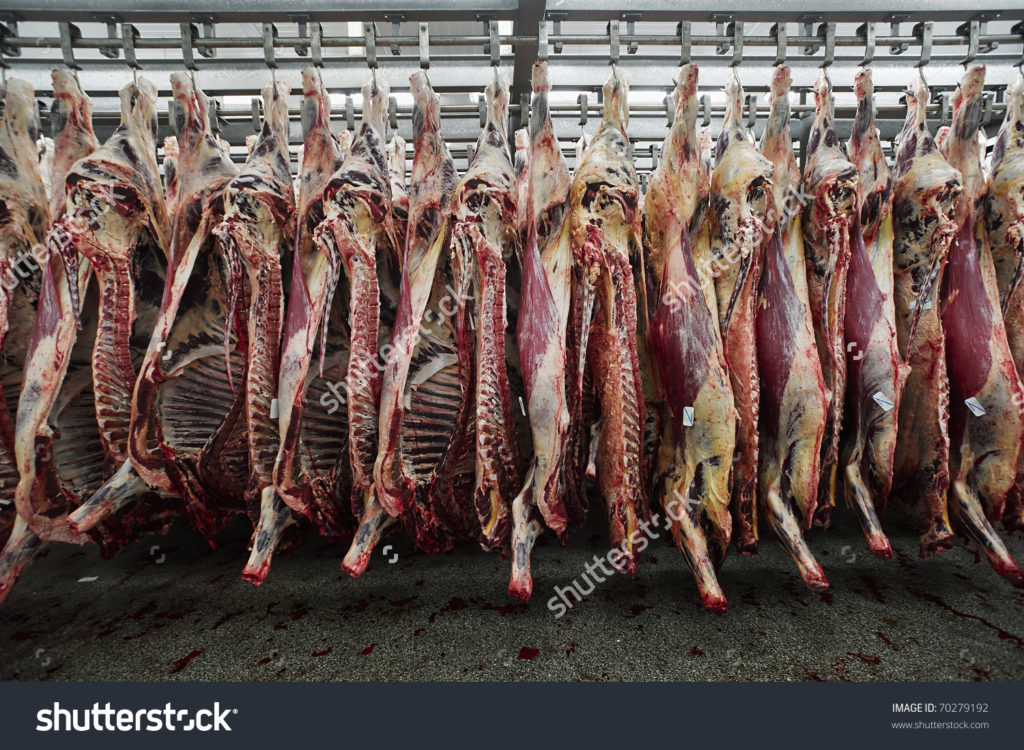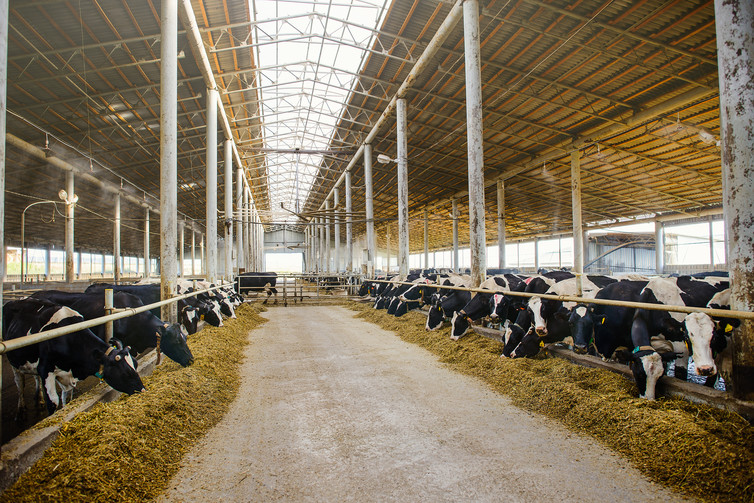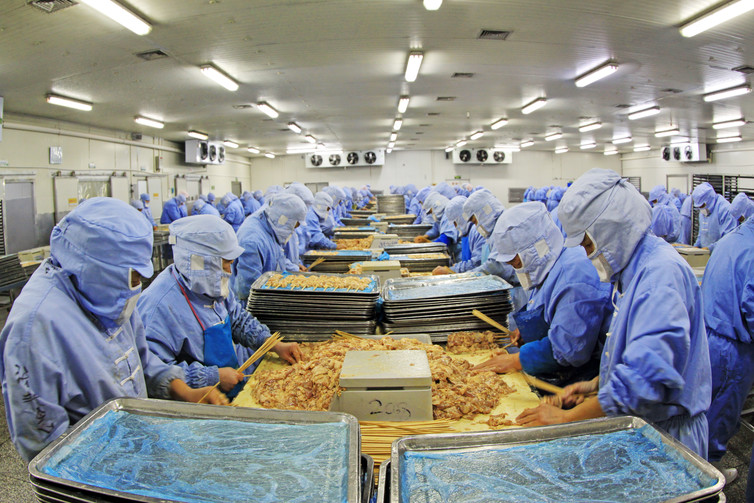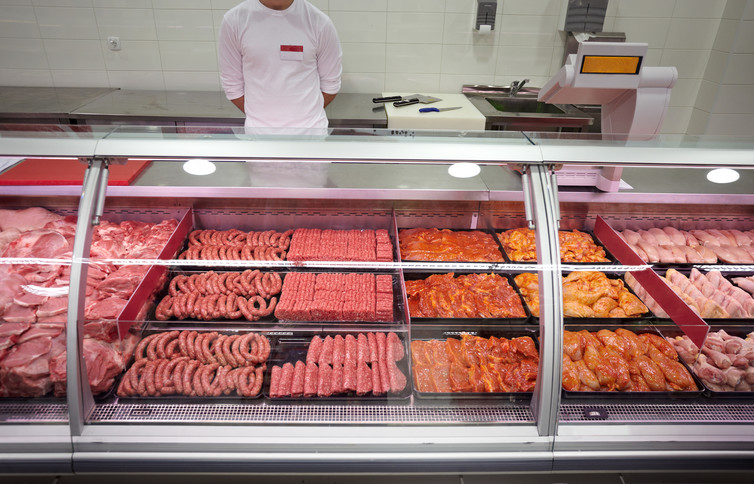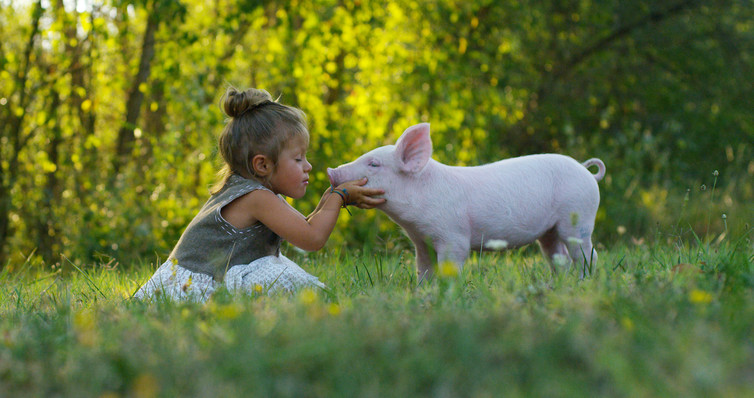Five Ways the Meat on Your Plate Is Killing the Planet
ANIMAL RIGHTS - VEGETARIANISM, 8 May 2017
Francis Vergunst and Julian Savulescu – The Conversation
26 Apr 2017 – When we hear about the horrors of industrial livestock farming – the pollution, the waste, the miserable lives of billions of animals – it is hard not to feel a twinge of guilt and conclude that we should eat less meat.
Yet most of us probably won’t. Instead, we will mumble something about meat being tasty, that “everyone” eats it, and that we only buy “grass fed” beef.
Over the next year, more than 50 billion land animals will be raised and slaughtered for food around the world. Most of them will be reared in conditions that cause them to suffer unnecessarily while also harming people and the environment in significant ways.
This raises serious ethical problems. We’ve compiled a list of arguments against eating meat to help you decide for yourself what to put on your plate.
- The environmental impact is huge
Livestock farming has a vast environmental footprint. It contributes to land and water degradation, biodiversity loss, acid rain, coral reef degeneration and deforestation.
Nowhere is this impact more apparent than climate change – livestock farming contributes 18% of human produced greenhouse gas emissions worldwide. This is more than all emissions from ships, planes, trucks, cars and all other transport put together.
https://www.facebook.com/ConversationUK/videos/751720768329599/
Climate change alone poses multiple risks to health and well-being through increased risk of extreme weather events – such as floods, droughts and heatwaves – and has been described as the greatest threat to human health in the 21st century.
Reducing consumption of animal products is essential if we are to meet global greenhouse gas emissions reduction targets – which are necessary to mitigate the worst effects of climate change.
- It requires masses of grain, water and land
Meat production is highly inefficient – this is particularly true when it comes to red meat. To produce one kilogram of beef requires 25 kilograms of grain – to feed the animal – and roughly 15,000 litres of water. Pork is a little less intensive and chicken less still.
The scale of the problem can also be seen in land use: around 30% of the earth’s land surface is currently used for livestock farming. Since food, water and land are scarce in many parts of the world, this represents an inefficient use of resources.
- It hurts the global poor
Feeding grain to livestock increases global demand and drives up grain prices, making it harder for the world’s poor to feed themselves. Grain could instead be used to feed people, and water used to irrigate crops.
If all grain were fed to humans instead of animals, we could feed an extra 3.5 billion people. In short, industrial livestock farming is not only inefficient but also not equitable.
- It causes unnecessary animal suffering
If we accept, as many people do, that animals are sentient creatures whose needs and interests matter, then we should ensure these needs and interests are at least minimally met and that we do not cause them to suffer unnecessarily.
Industrial livestock farming falls well short of this minimal standard. Most meat, dairy and eggs are produced in ways that largely or completely ignore animal welfare – failing to provide sufficient space to move around, contact with other animals, and access to the outdoors.
In short, industrial farming causes animals to suffer without good justification.
- It is making us ill
At the production level, industrial livestock farming relies heavily on antibiotic use to accelerate weight gain and control infection – in the US, 80% of all antibiotics are consumed by the livestock industry.
This contributes to the growing public health problem of antibiotic resistance. Already, more than 23,000 people are estimated to die every year in the US alone from resistant bacteria. As this figure continues to rise, it becomes hard to overstate the threat of this emerging crisis.
High meat consumption – especially of red and processed meat – typical of most rich industrialised countries is linked with poor health outcomes, including heart disease, stroke, diabetes and various cancers.
These diseases represent a major portion of the global disease burden so reducing consumption could offer substantial public health benefits.
Currently, the average meat intake for someone living in a high-income country is 200-250g a day, far higher than the 80-90g recommended by the United Nations. Switching to a more plant-based diet could save up to 8m lives a year worldwide by 2050 and lead to healthcare related savings and avoided climate change damages of up to $1.5 trillion.
Ultimately, it’s unethical
Most people agree that as a basic rule an action that promotes the overall happiness of others is morally good, while an action that causes harm or suffering without good justification is morally wrong.
Meat eating is wrong not because there is something special about pigs or chickens or dogs or cats, but because of the harm it causes, whether that harm is caused to animals, humans, or the wider environment.
Most people living in industrialised countries have historically unprecedented dietary choice. And if our nutritional needs can now be met by consuming foods that are less harmful, then we ought to choose these over foods that are known to cause more harm.
Eating less meat and animal products is one of the easiest things we can do to live more ethically.
_____________________________________________
Francis Vergunst – Postdoctoral researcher, Université de Montréal
Julian Savulescu – Sir Louis Matheson Distinguishing Visiting Professor at Monash University, Uehiro Professor of Practical Ethics, University of Oxford
Republish our articles for free, online or in print, under Creative Commons license.
Go to Original – theconversation.com
DISCLAIMER: The statements, views and opinions expressed in pieces republished here are solely those of the authors and do not necessarily represent those of TMS. In accordance with title 17 U.S.C. section 107, this material is distributed without profit to those who have expressed a prior interest in receiving the included information for research and educational purposes. TMS has no affiliation whatsoever with the originator of this article nor is TMS endorsed or sponsored by the originator. “GO TO ORIGINAL” links are provided as a convenience to our readers and allow for verification of authenticity. However, as originating pages are often updated by their originating host sites, the versions posted may not match the versions our readers view when clicking the “GO TO ORIGINAL” links. This site contains copyrighted material the use of which has not always been specifically authorized by the copyright owner. We are making such material available in our efforts to advance understanding of environmental, political, human rights, economic, democracy, scientific, and social justice issues, etc. We believe this constitutes a ‘fair use’ of any such copyrighted material as provided for in section 107 of the US Copyright Law. In accordance with Title 17 U.S.C. Section 107, the material on this site is distributed without profit to those who have expressed a prior interest in receiving the included information for research and educational purposes. For more information go to: http://www.law.cornell.edu/uscode/17/107.shtml. If you wish to use copyrighted material from this site for purposes of your own that go beyond ‘fair use’, you must obtain permission from the copyright owner.
Read more
Click here to go to the current weekly digest or pick another article:
ANIMAL RIGHTS - VEGETARIANISM:
